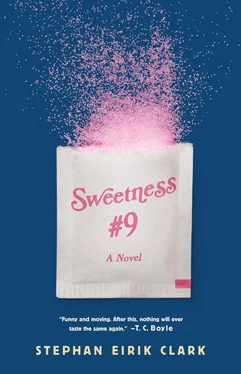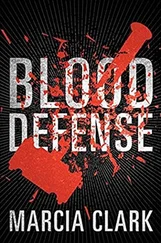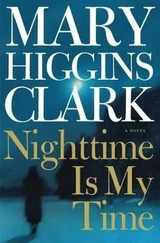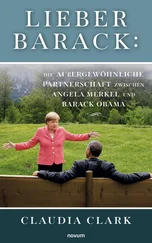Beekley had connected several of the cities on the map with a circle; now he drew a triangle that connected all the others, ending at the point of Moses Lake out west.
“What does it mean?” I said.
He stepped back, cocking his head to one side as he studied the geometric patterns on the map. “Just give me time, David. Every crime wants to sing for you. You only need to put it up on stage and wait.”
I told him to take as much time as he needed.
That evening, trying to be a good host, I cooked Ernst and Peter the best meal I could cobble together: the last of the spaghetti, meat sauce from a jar that had gone moldy underneath its cap, and a bit of limp white onion I’d found wrapped in a paper towel in the crisper drawer. Betty finished a tub cottage of cheese over which she’d sprinkled a handful of mandarin oranges she’d found in a rusty can. While she prayed against botulism, our son, relishing the opportunity to reacquaint himself with the taste of frozen food, laid claim to a small frozen pizza I’d brought back from his namesake’s freezer. He was so excited, he put it into the oven without knocking off the ice crystals that had gathered along its top. Then, because it had been removed from its packaging long ago and was therefore a mystery, he watched through the oven door as the ice melted, calling out his wishes as a craps player might call out the numbers he desired. “Canadian bacon and pineapple. Hawaiian pizza. Hawaiian.” Finally, florets of broccoli appeared against a floor of orange, white, and blue cheese, and the smell became unmistakable.
“Gorgonzola,” I said, as I pulled it out.
“Gross. Absolutely gross.”
Priscilla dined on toasted white bread with a thin wasabi mayonnaise spread, and ate a side of edamame beans that had been seasoned with rock salt and toasted in a pan. When I told her this sounded quite delicious, she said the mayo didn’t taste off but was past its “Best By” date and therefore difficult to enjoy, while the beans were too soft after sitting in the back of the fridge uneaten for more than a week.
At some point we turned on the TV and learned that what had been a rumor in the late afternoon was now a confirmed fact: a boy no older than Ernest had been arrested in Rockaway after he’d reached into his backpack and attempted to transfer a box of ramen to a grocery store shelf, only to have the jerry-rigged contraption detonate in his hands. One of the talking heads on cable was quick to label this a copy-cat attack. The explosive he’d used was barely stronger than a firecracker, and besides, he didn’t even have a driver’s license, so how could he have targeted so many supermarkets in so many different cities and states? Another commentator wasn’t so sure. He said a group of children might be responsible for these attacks, teenagers communicating via the Internet. “There could be an army of them out there,” he said. “Decentralized, asynchronous, irregular — a threat unlike any we’ve known since the Viet Cong.”
When my mentor reached for the remote and clicked over to World War II in Color, no one argued. We’d all had enough.
“What are we going to do about Thanksgiving?” Priscilla said. It was two days away, and with the many hours required to thaw a frozen bird, and the difficulty of finding one that was fresh, we were running out of time to get a turkey.
Betty wondered why a vegan would be worried about any of this, but Priscilla, without looking at me, spoke of giving herself a “special dispensation to eat meat,” calling it a “cultural rite” and tradition. “Besides, there’s still sweet potatoes and stuffing to think about,” she said.
“And pie,” said Ernest, looking up from the last of his gorgonzola pizza.
“That’s right,” Priscilla said. “We need a pie. How can we have Thanksgiving without a pumpkin pie?”
“Let’s just have a little patience,” I said. “Let the police do their thing, question this boy, see what’s really going on.”
“Your father’s right. They might crack this case tonight, and then tomorrow evening we can go shopping without any fear.”
By bedtime, the cable channels were replaying the same footage over and over again, showing the boy’s parents in Rockaway running from their modest house to their pick-up truck, off to see their son in custody. The man covered his face with his denim jacket, the mother with her Le Sac purse. But the woman made a mistake. Just before stepping up and into the truck, she lowered her purse and glanced back at the camera crews set up on the street. It was all the news channels needed. They froze on that image and blew it up until it was pixelated and fuzzy, like some disputed snapshot of Bigfoot.
In bed, I clicked away from CNN to Fox, where a famous evangelical was saying the child’s involvement wasn’t a surprise. “We’ve got kids being raised up by microwave ovens and big-screen TVs, and still you think we’re living in The City on a Hill?” He shared the split screen with a short-haired woman who vigorously shook her head each time he smiled. “I wouldn’t be surprised if there were an army of children behind these bombings, all of them protesting the meals their working mothers are feeding them. We need to get back to good, old-fashioned family values again.”
Betty groaned as she reached to her lap for the control dial of the FaceLift Mask™ she was wearing. She’d bought the device from one of the shopping channels, and though she’d come to accept that it didn’t make her look any younger, she liked how the short electrical impulses felt while they clenched and unclenched the muscles in her cheeks. I’d tried it once myself, in private. She was right; it did feel good.
“Of course,” she said. “A bad mother storyline. It’s always a bad mother storyline. ‘If only she’d been waiting for him at home with a glass of milk and a plate of warm cookies…’”
I flipped over to MSNBC, where a correspondent in Rockaway was demonstrating the type of store-supplied reacher now in wide use across the tri-state area. It had a thirty-inch aluminum arm that ended in a pincher controlled by a four-finger grip. The newsman used it to grab a box of Stove Top Stuffing that had been set out on a table before him.
“You’d think he was handling plutonium,” I said.
Betty’s thoughts were somewhere else, though. “You don’t think E could do something like this, do you?”
I hit the mute button and looked at her. “Ernest? No. God, Betty. Why?”
“What if he’s suicidal? You don’t think he’s suicidal, do you?”
I hit the power button and set the remote down. “Because he doesn’t use any verbs?”
“How could we know?” She looked like the Phantom of the Opera. “He says one word for every hundred we hear from Priscilla.”
“But suicide. How could you even say it?”
“Good parents talk, don’t they? I thought good parents talk.”
I looked to the black screen, not sure what to say. She was right. How could we know? We’d only learn the truth after the fact. Suicides are at least kind in that regard. If murderers are like modernists, writers of dense impenetrable prose, their incomprehensible screeds and manifestos jumping off of rolls of dried vellum and continuing at a slant across the walls, then suicides are minimalists, their sentences plain and unadorned, like the final memos of frustrated bureaucrats. We need to simplify the tax code…limit the power of the credit-reporting agencies…teach people that true love requires true love.
“I talked to Dr. White this afternoon,” Betty said. “The prescription’s ready for us in the system. I just have to go to the pharmacy and get it filled.”
I sat up a little higher in bed. “You did this without talking to me?”
Читать дальше












